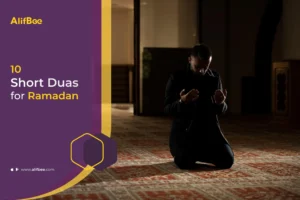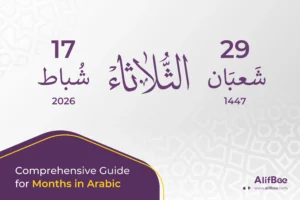8 Ways to Say Travel Prayer in Arabic for Hajj and Umrah
Preparing for Hajj or Umrah isn’t like getting ready for a regular trip. It’s not just about packing your bags—it’s about preparing your heart, your soul, and even your words. One of the most beautiful ways to connect spiritually while traveling is by using Arabic travel prayer (duaa) that are rooted in the Sunnah and have been passed down through generations of pilgrims.
In this article, we will learn 8 ways to say travel prayers in Arabic and understand what they mean and listen to how they are pronounced.
But first, let’s answer a common question about the Hajj season to get an idea of the expected duration of this religious trip.
How Long Is Hajj?
- Hajj takes about 5 to 6 days, officially from 8th to 13th Dhul Hijjah.
- The broader Hajj season (months of Hajj) spans Shawwal, Dhul Qa’dah, and the first 10 days of Dhul Hijjah.
- Many people also combine their journey with Umrah, especially if they arrive early.
- So while the hajj rituals are performed over a few days, the journey—spiritually and physically—can be much longer.
Did You Know?
Hajj is one of the five pillars in Islam and it coincides with Eid ul-Adha (The Feast of Sacrifice), one of the two main Muslim celebrations every year. The second one being Eid ul-Fitr, which usually comes to celebrate the end of the month of Ramadan.
Travel Prayer in Arabic for Hajj and Umrah
Now let’s look at the 8 travel prayers. Each of these prayers is rooted in the Sunnah and Islamic tradition, perfect for reciting during your journey, from the moment you set off, to the time you return home.
Oh, Allah, we ask of You the righteousness and piety in this travel
Alllahumma innā nasʼaluka fī safarinā Hādhā albirra wālttaqwá
اللَّهُمَّ إِنَّا نَسأَلُكَ في سَفَرِنَا هذا البِرَّ والتَّقوى
This beautiful Arabic duaa was taught by the Prophet Muhammad ﷺ and is part of the authentic travel supplication narrated in Sahih Muslim (1342). It’s often recited at the start of a journey, especially for spiritual travels like Hajj and Umrah.
Let’s focus on two important words in this duaa:
- البِرَّ – righteousness, which includes good deeds, honesty, kindness, and fulfilling your duties to others
- وَالتَّقْوَى – piety, or mindfulness of Allah, making choices that please Him and avoiding what displeases Him
With this duaa, you’re asking Allah to make your trip more than just physically safe; you’re asking Him to help you stay spiritually focused, morally upright, and mindful of Him at every step.
Oh, Allah, we ask of You the ability to carry out actions which are pleasing to You in this travel
Alllahumma innā nasʼaluka fī safarinā Hādhā mina alʻamali mā tarḍá
اللَّهُمَّ إِنَّا نَسأَلُكَ في سَفَرِنَا هذا مِنَ العَمَلِ ما تَرضى
This supplication continues from the first and is also part of the complete travel duaa found in the Sunnah. After asking for righteousness and piety, the traveler now asks for the ability to act in ways that are pleasing to Allah during the journey.
- مِنَ الْعَمَلِ – from the actions or deeds
- مَا تَرْضَى – what pleases You (Allah)
It’s easy to get caught up in the logistics of travel (flights, crowds, fatigue), but this prayer gently redirects your heart to the bigger goal: pleasing Allah through your actions.
Oh, Allah, please ease our travel
Alllahumma hawwin ʻlaynā sfaranā hadhā
اللَّهُمَّ هَوِّن علَينا سفَرَنَا هَذَا
Hajj and Umrah can be physically and emotionally demanding. Many challenges can arise from long walks between rituals to intense heat or unexpected delays. With this duaa, you’re not asking for a luxurious or perfect trip, just one that is manageable, peaceful, and free from unnecessary hardship.
Oh, Allah, please shorten its distance
Alllahumma aṭwi ʻnnā buʻdahu
اللَّهُمَّ اطوِ عنَّا بُعدَهُ
Long hours of travel—by plane, bus, or foot—can feel exhausting. This duaa beautifully expresses what we all hope for during difficult or draining moments: “Let this part pass quickly, O Allah.”
The word اطوِ means “to fold” in the literal sense, and with the word بُعد, which means, distance, the meaning becomes, “fold its distance” or make the distance shorter.
Oh, Allah, You are our Companion in travel
Alllahumma anta alṣṣāḥibu fī alssafari
اللَّهُمَّ أَنتَ الصَّاحِبُ في السَّفَرِ
When you leave your home, routines, and loved ones, there’s always a feeling of vulnerability. This prayer brings comfort by reminding you that Allah is with you, watching over you, guiding you, and never leaving your side.
Oh, Allah, You are the Guardian of our families
Alllahumma anta alkhalīfatu fī alʼahli
اللَّهُمَّ أَنتَ الخَلِيفَةُ في الأَهلِ
Many people performing Hajj or Umrah travel without their families. It’s natural to worry about your spouse, children, or parents while you’re not there. This Arabic duaa brings peace of mind. It says, “Ya Allah, I trust You to take care of them while I’m gone.” It’s deeply emotional and shows the beauty of full reliance on God.
Oh Allah, we seek refuge in You from travel difficulty and from seeing things which cause grief
Alllahumma innī aʻūdhu bika min waʻthāʼi alssafari, wkʼābti almanẓari
اللَّهُمَّ إِنِّي أَعُوذُ بِكَ مِن وَعثَاءِ السَّفَرِ، وكآبةِ المَنظَرِ
This duaa asks Allah to shield you from illness, injury, witnessing accidents, or simply experiencing something unpleasant during Hajj.
The Arabic Duaa “waʿthā’i as-safar” refers to the hardships, fatigue, and discomfort that often come with traveling, and “ka’ābati al-manzar” refers to the grief or distress caused by seeing something painful, shocking, or unpleasant during your journey.
Allah, we seek refuge in You from a bad return to our wealth and family
Alllahumma innī aʻūdhu bika min sūʼi almunqalabi fī almāli wālʼhli wālwaladi
اللَّهُمَّ إِنِّي أَعُوذُ بِكَ مِن سُوءِ المُنقَلَبِ في المالِ والأهلِ وَالوَلَدِ
After completing a spiritually life-changing experience like Hajj or Umrah, this duaa expresses the hope that you’ll come home to peace, blessing, and stability. You’re asking Allah to protect what you left behind; your family, finances, and future, from harm, loss, or turmoil.
Final word
Whether you’re on your way to Makkah, preparing for a future trip, or simply deepening your Arabic, these prayers remind us that every journey is in Allah’s hands.
Memorize a few. Say them with your heart. And let your tongue find comfort in the language of faith.
Want to learn more Arabic for Hajj, Umrah? Download the AlifBee App where you will find a complete course for Hajj and Umrah covering everything pilgrims need from language preceding the trip, to essential words and phrases during Hajj and after performing the rituals.
FAQs
The actual rites of Hajj take about five days, but many pilgrims spend up to two to three weeks in Saudi Arabia, especially if they are combining Hajj with Umrah or visiting Madinah.
The official months of Hajj are Shawwal, Dhul Qa’dah, The first ten days of Dhul Hijjah.
Pilgrims can enter ihram for Hajj anytime during these months, although the main rituals happen in Dhul Hijjah
The Hajj travel duaa includes a set of Arabic prayers asking Allah for ease, protection, and spiritual benefit. These were taught by Prophet Muhammad ﷺ and reflect the humility and purpose of the pilgrim.
Yes! While many associate these Arabic duaa with Hajj and Umrah, they are also ideal for any kind of travel—whether you’re flying, commuting, or moving to a new place.
Yes. A recommended prayer when returning is:
اللَّهُمَّ إِنِّي أَعُوذُ بِكَ مِنْ سُوءِ الْمُنْقَلَبِ فِي الْمَالِ وَالْأَهْلِ وَالْوَلَدِ
O Allah, I seek refuge in You from a bad return to my family, wealth, and children.
It reflects the hope that you return in safety, with your blessings intact.
Saying travel prayers in Arabic connects Muslims with the words of the Prophet ﷺ, invites barakah (blessing) into their journey, and brings peace of mind. These prayers are rooted in Islamic Sunnah and tradition and used for both spiritual and everyday travels.








